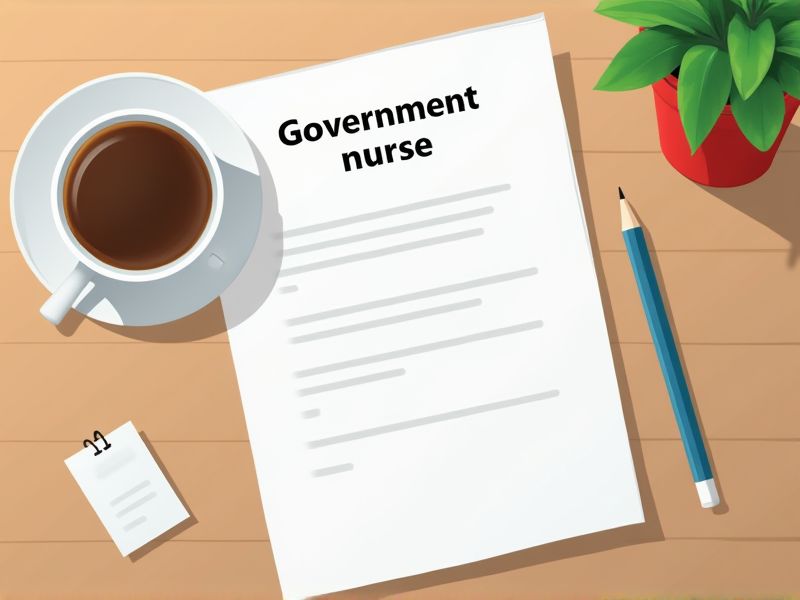
The healthcare sector demands skilled nursing professionals to maintain quality care standards. Acquiring certain certifications helps government nurses meet these demanding benchmarks and improve patient outcomes. Certifications ensure nurses keep pace with evolving healthcare technologies and practices. Key certifications essential for government nurses include the following.
Registered Nurse (RN) License
The RN license ensures that government nurses meet standardized qualifications, which ensures baseline competency in patient care. It serves as a regulatory mechanism, reducing instances of malpractice and enhancing the safety of public health services. Government agencies often require standardized credentials to maintain consistency, quality, and public trust in healthcare services. An RN license is critical for qualification in specialized roles and access to career advancement opportunities within government healthcare facilities.
Basic Life Support (BLS) Certification
Holding a Basic Life Support (BLS) Certification enhances a government nurse's ability to provide immediate, critical care during emergencies, improving patient survival rates. This certification aligns with healthcare regulations and standards, ensuring nurses maintain a high level of competency and readiness. By being BLS certified, nurses can effectively collaborate with other emergency responders, facilitating cohesive teamwork in urgent situations. In many jurisdictions, BLS certification is a mandatory requirement, impacting employability and licensure for government nurses.
Advanced Cardiac Life Support (ACLS) Certification
Advanced Cardiac Life Support (ACLS) Certification equips government nurses with essential skills to manage life-threatening cardiac emergencies, enhancing patient survival rates. The training ensures nurses remain updated with the latest protocols, fostering improved teamwork during critical care situations. ACLS Certification is often mandated by healthcare facilities, ensuring a standardized level of care among healthcare providers. Possessing this certification can expand career opportunities and professional credibility for government nurses in various healthcare settings.
Pediatric Advanced Life Support (PALS) Certification
Government nurses often work in environments where pediatric emergencies can arise; PALS certification equips them with the necessary skills to effectively manage critical situations involving children. This specialized training enhances their ability to perform advanced resuscitation techniques, vital in improving patient outcomes in pediatric cases. Government healthcare facilities require adherence to established safety and care standards; PALS certification ensures compliance with these protocols. Due to the diverse nature of cases government nurses encounter, having PALS certification broadens their competency, allowing them to provide comprehensive care to younger patients.
Neonatal Resuscitation Program (NRP) Certification
Neonatal Resuscitation Program (NRP) Certification ensures government nurses are skilled in life-saving techniques for newborns, directly impacting infant survival rates. By equipping nurses with specialized training, the certification reduces the risk of complications during emergency situations. With NRP Certification, nurses adhere to standardized protocols, enhancing the quality of neonatal care across public health systems. This certification aligns with government health objectives to improve maternal and child health outcomes.
Certified Public Health Nurse (CPHN)
Certified Public Health Nurses (CPHN) bring specialized expertise in public health principles that enhance community-focused initiatives. Their training in disease prevention and health promotion improves government efforts to manage public health crises effectively. CPHNs bridge gaps between healthcare systems and vulnerable populations, supporting equitable health access. Their data-driven approach informs policy-making, optimizing resource allocation for better health outcomes.
Critical Care Registered Nurse (CCRN) Certification
CCRN certification enhances a nurse's expertise in providing advanced critical care, which aligns with the rigorous demands of government healthcare facilities. It demonstrates a commitment to the highest standards of patient safety and care, which is crucial in public health settings. The certification may lead to better resource allocation and improved patient outcomes in government hospitals. It also aids in professional recognition and career advancement, which supports institutional goals of quality improvement.
Certified Medical-Surgical Registered Nurse (CMSRN) Certification
Certification enhances a nurse's expertise, ensuring higher standards of patient care. The CMSRN certification validates specific knowledge in medical-surgical nursing, critical for complex government healthcare settings. Government institutions often prioritize certified nurses, leading to potential career advancement and job security. Certified nurses typically demonstrate greater confidence and competence, positively impacting patient outcomes in government facilities.
Infection Control Certification (CIC)
Government nurses with Infection Control Certification (CIC) are better equipped to prevent and manage healthcare-associated infections, improving patient safety. This certification demonstrates a nurse's proficiency in current infection control standards and practices. By obtaining CIC, nurses enhance public health by reducing the spread of infectious diseases in government healthcare settings. Government agencies often prioritize such certifications, reflecting a commitment to maintaining high-quality care and compliance with national health regulations.
Disaster Nursing Certification (DNC)
The Disaster Nursing Certification (DNC) equips government nurses with specialized knowledge and skills essential for responding effectively to emergencies and natural disasters. This certification enhances their ability to manage finite resources and coordinate care under extreme conditions, benefiting public health systems. A trained workforce in disaster nursing ensures quicker response times and reduced mortality rates during crises. Regulatory and policy standards often require certified professionals to align with regional emergency preparedness protocols.
Summary
When you receive additional certifications as a government nurse, you can anticipate enhanced career opportunities and potential salary increases due to your advanced skills. Certifications can improve your confidence in delivering specialized care, boosting your professional reputation among peers and patients. Institutions may benefit from retaining highly qualified staff, leading to improved patient outcomes and compliance with healthcare standards. Certification can foster a culture of ongoing learning within healthcare settings, encouraging colleagues to seek further development.
